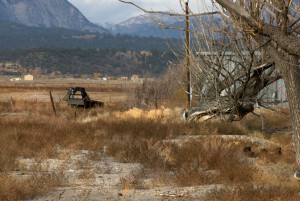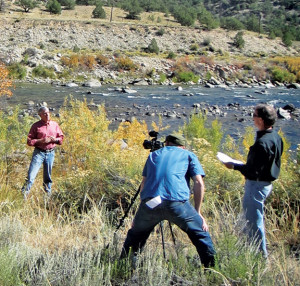By E.J. Phillips
I reach up a wee bit higher, first with one hand, then the other, clinging to the round, gritty surface. My arms spread out and fingers grasp tight. Inch by inch I scale the rock until I reach a small scooped-out hollow carved by wind and rain. I wiggle into the little nook, then turn and peer carefully over the edge to see how high I have climbed. Cautiously I creep up a few more steps until I stand on top of a giant boulder. It is like a gray stone fortress, standing guard over the arroyo stretching beneath me.
My grandparents called this place Bear Gulch. Located in southern Colorado, this gully-ridden, jagged mountainside was dotted with straggly cedar trees that struggled to stay alive. Covered with smooth rocks, sharp-edged rocks, little rocks and big rocks, it was a place where big black bears and little brown bears once roamed, built their homes, and hid their young.
From where I sat on the rock, I could see below, first curving south, then back west, the dusty, narrow road as it meandered up to where my grandparents’ home sat tucked against the mountainside. Weathered and gray-brown, the hewn stone house blended in with the rocky hillside as if it had rolled in on the same prehistoric tidal wave. Sometimes I wondered if Grandpa carved his house out of one of those boulders.
Grandpa was a round, not-too-tall man, always with a sweat-stained, gray felt hat snug on his head, his boots scuffed and run over at the heel. He raised goats, probably the only food-producing livestock that could survive on this barren hillside. North of my perch, I saw his goat pen, pebble-strewn with straggly wire and fence posts a bit out of line. There, two goats stood munching on prickly pear cactus and tough, stunted scrub cedar trees.
Grandma was a slow-moving, soft-voiced woman, her graying hair bundled back in a knot and an apron covering her dress. She raised children. Eight of them. Five boys and three girls that now all had families of their own. Every August the family pilgrimage to Bear Gulch brought aunts, uncles and cousins to Grandpa and Grandma’s home. At night, the living room floor of the old house became a nursery of angelic faces snuggled down in patchwork quilts.
Grandma cooked breakfast for all those hungry kinfolk on a big, black wood-burning stove. Even today, sixty-some years later, I hear the “perk-burble-perk” of the coffee. My mouth waters as I smell salty, home-cured bacon and hot pancakes. That was Grandma’s specialty – pancakes. Yellow batter sizzling and spitting as she poured it on the smoky cast-iron griddle. I stood on a scarred wooden stool to watch the pancakes bubble and Grandma flip them over. She scooped up those two crusty brown circles and slid them onto my plate with a mound of golden butter churned by either she or one of my aunts. She slathered the pancake with homemade syrup and with her spatula, pointed me to the planked wooden table – the table where my father and his four brothers once waited for their pancakes and while waiting, scratched their names with their pocketknives.
Up the hillside to the south stood the weathered roof of old Rockvale School, a one-room building where three of my uncles once hunkered over pine desks, pencils in hand, trying to learn readin’ and writin’ and ‘rithmetic. Most of the shingles had blown off the roof and down into the valley. Weather or destruction-bound people long ago shattered the windowpanes. Dirt, rainwater and snow stained and streaked the panes that were still there. Not that I could see all that from here. I only knew about it because my uncles had once taken me there.
To the south was the rugged valley that gave Bear Gulch its name. Not much of anything green grew in that valley. Mottled, dull, gray-white mountain ridges, razor-edged, rose up abruptly from the dusty ravine. I saw those spines clearly in that mid-afternoon Colorado sun. And caves. I never saw the caves, but Grandpa told me about them. He described the craggy gray hillside he lay upon as he watched the bear cubs tumble and play just outside dark, cavernous openings.
From my lookout on the boulder, I saw humps of pale, dry, powdery clay on the floor of the ravine. Men once dug in that clay hoping to find a few pieces of coal to warm their homes. “Not an easy place to live, this gulch,” Grandma said many times.
For me, this was a magic place. In the daytime, my cousins and I ran as wild as Grandpa’s goats. We climbed up the mountain and wandered down toward the gullies.
“Don’t go down in that ravine,” some mother or aunt would call out. “You’ll fall in the underground river.” An underground river! How deliciously shivery! We were not sure where the river was, but we could hear the faint rumble of water – couldn’t we? It never occurred to us that if it was underground, how could we fall in?
Today my grandparents are gone, the house no longer stands, and somehow, the rock has shrunk. But my sixty-year-old heart remembers Bear Gulch and the enormous stone sentinel that stood strong and proud over a castle filled with love, that protected my grandparents’ home, kept it safe and gave me a rocky wonderland for my rambling feet.
Many years ago, before Taos Highway was “Old” Taos Highway, E.J. popped over the hill north of Santa Fe and fell in love with the panorama before her – flat roofed, mud huts along with bristly pine trees and yellow chamisa bushes growing out of the rocky hillside. She has a home in Oklahoma, but prefers to write memoirs and historical fiction in her own little mud hut located half way up Old Taos Highway.



Loved the story!
I loved it too! like the hear about things in fremont county!
This was great ! I was mesmerized and seeing Bear Gulch through her words as if I was actually there in her place .